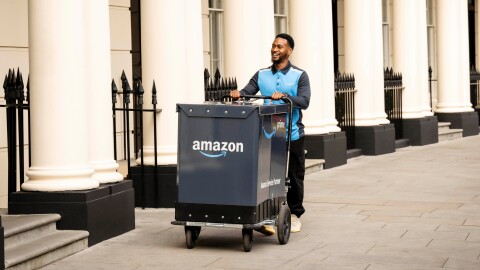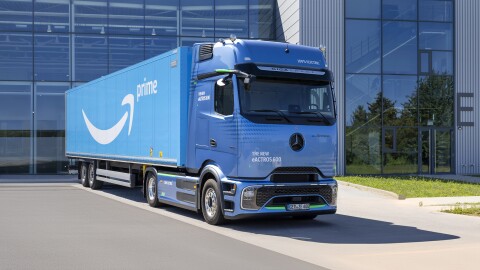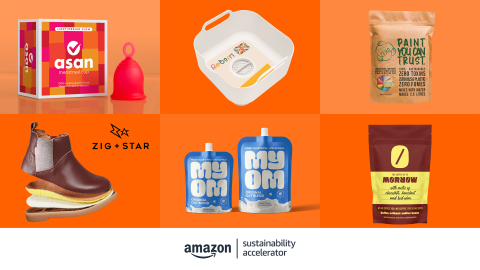Last year, Amazon teamed up with The Royal Academy of Engineering and BecomingX to launch a film series which profiled pioneering women engineers for International Women in Engineering Day. This year, Amazon is continuing the series with new films to spotlight world-changing engineers in support of UNESCO World Engineering Day for Sustainable Development (4th March).
A trio of biomedical ‘Engineering Heroes’ have joined British astronaut Tim Peake in celebrating the role that engineering has played in shaping their careers, protecting the planet and delivering better healthcare.
“Engineering has taken me to space, and has led others to develop ways of living on Earth more sustainably, and to invent life-saving vaccines and transport them to every corner of the globe,” Tim commented, continuing on to say that “I hope my story helps inspire some of the younger generation to take their own giant leaps towards engineering a brighter future for themselves and our planet.”
The films, which aim to inspire young people from all genders, ethnicities and parts of society to consider engineering as a career, feature:
- Tim Peake CMG, who became the UK’s most famous astronaut and spent six months on the International Space Station. Tim is renowned for his enthusiastic promotion of science, technology, engineering and maths (STEM) education and careers to young people, explaining how STEM skills enabled him to travel into space.
- Professor Frances Arnold FREng, who became a globally recognised chemical engineer and the first American woman to receive the Nobel Prize for chemistry in 2018 for her work in evolving enzymes so they can be used to help make fuels, chemicals and materials less harmful to the environment.
- Professor Robert Langer FREng, who became a pioneering chemical engineer and winner of the Queen Elizabeth Prize for Engineering in 2015. Robert is the most cited engineer in history and is probably best known as the Co-Founder of Moderna, the biotech start-up that was one of the first companies to pioneer the mRNA vaccines (used to tackle Covid-19).
- Nanxi Liu, an engineer and entrepreneur who, by the age of 25, co-founded Nanoly Bioscience - venture-backed biotech company that that enables vaccines to be transported without refrigeration. One of Forbes’ 30 under 30, Nanxi is now Co-CEO and Co-Founder of Blaze Technology, a platform that enables people to build software with no code.
The Royal Academy of Engineering’s work with Amazon is designed to encourage young people into engineering and computer science careers as part of Amazon Future Engineer, our comprehensive childhood-to-career programme aiming to inspire, educate and enable children and young adults from lower-income backgrounds to try computer science and pursue careers in this field.
Hear from our Engineering Heroes below, as they share their experience of becoming engineers and provide advice for those interested in following in their footsteps.
This content is hosted by a third party (www.youtube.com).
To view the content, you need to consent to cookies by selecting Accept all in the popup banner. Or you can go to the site footer, select Cookie Preferences, and then select On under Functional Cookies, Performance Cookies and Advertising Cookies.
This content is hosted by a third party (www.youtube.com).
To view the content, you need to consent to cookies by selecting Accept all in the popup banner. Or you can go to the site footer, select Cookie Preferences, and then select On under Functional Cookies, Performance Cookies and Advertising Cookies.
This content is hosted by a third party (www.youtube.com).
To view the content, you need to consent to cookies by selecting Accept all in the popup banner. Or you can go to the site footer, select Cookie Preferences, and then select On under Functional Cookies, Performance Cookies and Advertising Cookies.
This content is hosted by a third party (www.youtube.com).
To view the content, you need to consent to cookies by selecting Accept all in the popup banner. Or you can go to the site footer, select Cookie Preferences, and then select On under Functional Cookies, Performance Cookies and Advertising Cookies.
Lauren Kisser, Director at Amazon’s Development Centre in Cambridge and head of Alexa AI Information, says: “World Engineering Day for Sustainable Development is a brilliant way to inspire the next generation of future engineers and celebrate the important work engineers do to create a more sustainable future. Role models have played a crucial part in my career and I believe they are key to engaging young people, especially young women and girls, and showcasing the range of fascinating careers in engineering. By sharing the stories of our Engineering Heroes - Tim Peake, Frances Arnold, Nanxi Liu and Robert Langer - as part of our Amazon Future Engineer programme, we want to encourage the next generation to consider what an engineering and computer science career might look like.”
“The Academy, Amazon and BecomingX share an ambition to inspire and support young people to become the next generation of engineers and computer scientists,” says Dr. Hayaatun Sillem CBE, Chief Executive of the Royal Academy of Engineering.
“These new films carry a powerful message that anyone can follow their passion and become an engineer, and that engineering innovation is central to addressing global challenges, such as improving healthcare and tackling climate change.”
The 'Engineering Heroes’ films will be shared on social media and distributed to schools through the BecomingX Education Programme and the Royal Academy of Engineering’s Connecting STEM Teachers Network, supported by Amazon.
Watch last year’s videos with BecomingX and the Royal Academy of Engineering, celebrating International Women in Engineering Day, or learn more about some of our other projects with the Royal Academy of Engineering, like our ‘Amazon Future Engineer’ Bursaries, or the ‘This is Engineering Day’ campaign.











